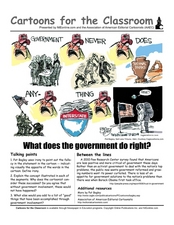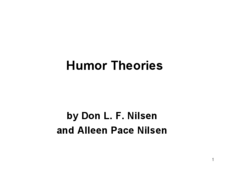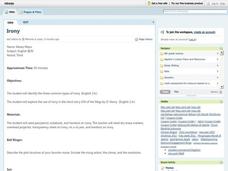Curated OER
Cartoons for the Classroom: Sarcasm, Irony, and Satire
Satire, sarcasm, or irony? Editorial cartoons have long been the tool artists use to express their opinions about politics and politicians. Kevin "Kai" Kallaugher's four-panel cartoon offers readers an opportunity to examine how he uses...
Curated OER
Cartoons for the Classroom: What's Next in 2011?
Examine the toolbox of political cartoons with this analysis handout, which features a cartoon utilizing satire, sarcasm, and irony as it predicts the current events of 2011. Interestingly, this will also serve to get scholars looking...
Curated OER
Cartoons for the Classroom: Social Commentary
Expose your class to the genre of political cartoons less concerned with serious political issues. This political cartoon analysis handout features social commentary on the many entertainments of youth, ironically paired with their...
Curated OER
What Does the Government Do Right?
Challenge your class to reevaluate preconceived notions about government with this political cartoon analysis. An image presents a clear example of irony, in which a disgruntled American complains about his government, yet fails to see...
Curated OER
Analyzing the Use of Irony in a Short Story
Ninth graders examine how literature connects to real-life and see how irony aids in the development of theme. They read Shirley Jackson's The Lottery, and discuss elements of foreshadowing and situational irony. Then learners will write...
Curated OER
Convince that Jury (Inspired by Roald Dahl's
What happened to a murder case when the police eat the murder weapon? After reading Roald Dahl's dark and ironic short story "Lamb to the Slaughter," students write a persuasive essay to convince a jury that the wife who killed her...
Curated OER
Urban Legends
Irony, hyperbole, and other rhetorical devices are at play in this presentation about urban legends. Several examples of urban legends help to clarify the analysis, making it valuable for those who have a hard time wrapping their mind...
Curated OER
Literature and Humor
From Canterbury Tales to The Odd Couple, this presentation details the different treatments of humor in different literary formats. Numerous authors and works of literature are represented here as examples of satire, irony, comedy, and...
Curated OER
Humor Theories
Providing ample examples of humor in literature, psychology, and sociology, this presentation studies the concept and function of humor in society today. Covering what is classically "funny" and what is not, and why, the slideshow will...
Curated OER
Irony
Using examples from Socrates to Johnny Carson, this slideshow presents your students with the history and definition of dramatic irony, satire, situational irony, and tragic irony. This presentation would be useful in a language arts...
Curated OER
Pride and Prejudice: Concept/Vocabulary Analysis
Clarify the setting, literary themes, and potential vocabulary issues with a concept analysis resource. With thoughtful explanations of many parts of Jane Austen's Pride and Prejudice, the reference sheet will be a great...
Curated OER
What is Figurative Language?
Need a review of literary terms and figurative language? Although text heavy, these slides clearly define frequently used terms and provide color-coded examples.
Curated OER
Literary Techniques
Need to review literary terms/techniques with your class? The slides in this presentation define and give examples of 22 common literary terms. The PowerPoint could be used for AP test prep.
Curated OER
The Tell-Tale Heart
Bring Edgar Allan Poe's spooky story to life! After reading the short story "The Tell-Tale Heart," middle and high schoolers identify the theme, character traits, irony, and other story concepts. During pre-reading, they take notes,...
Curated OER
Figures of Speech Quotes and Examples
Providing several examples of figures of speech, such as irony, paradox, and personification, this presentation could complement your lecture on pragmatic humor or humor in writing. Examples from Lewis Carroll's Alice's Adventures in...
Curated OER
Irony in Poetry and Prose (Fiction and Non-fiction Texts)
Middle and high schoolers examine the impact of irony in poetry and prose. In this figurative language lesson plan, they read instructor-selected literature and identify uses of irony. Then they discuss how irony enhances literature.
Curated OER
Irony
What are the three types of irony? High schoolers engage in a lesson about the use of irony while reading O.Henry's short story "Gift of the Magi." They'll discuss rising action, climax, and resolution in the text before highlighting the...
Curated OER
Academic Vocabulary
Arm your writers with an arsenal of literary terms. With definitions of everything from plot structure and figurative language to point-of-view and types of irony, learners will gain an understanding of elements in stories and be able to...
Curated OER
Gift of the Magi
While reading O Henry's "The Gift of the Magi," your class will define and identify situational irony and allusion. Use a study guide (not included, but easy to produce) to record and discuss examples of allusion as you read. Map the...
Curated OER
Editorial Cartoons
Do your classes love reading and drawing cartoons? Middle schoolers read an editorial cartoon from a newspaper. They discuss the cartoonist's topic, audience, and purpose. Next, they brainstorm questions they have about the cartoon and...
Curated OER
Semantic Gaps and Sources of New Words
The 44 slides in this power point presentation make visual the salient points in a college lecture to develop language and semantic awareness.
Curated OER
Speech Acts
See various examples of connotations in phrases and semantics. Speech acts are displayed along with their contexts and meanings.
Curated OER
Semantics
Use this PowerPoint in your college linguistics, English, psychology, or communications studies course. Not flashy, this presentation is still full of high-level concepts and vocabulary regarding semantics and verbal ambiguities, irony...
Curated OER
What is Language?
Intended to be used along with the first chapter of An Introduction to Language textbook, this PowerPoint is full of linguistic terminology that is not necessarily explained. This tool can be used to complement a lecture or a text, but...

























